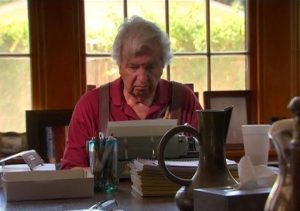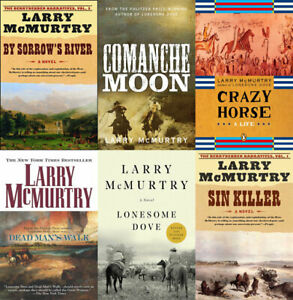Two years ago, when I heard that Larry McMurtry passed away in his Archer, Texas, home at the age of 84, I was saddened.
What a loss! What a prolific writer! What a storyteller!
His 30 novels, many of which have been turned into classic films and television series, such as The Last Picture Show, Lonesome Dove, Terms of Endearment, and Comanche Moon, are brilliant in their ability to delineate convincing characters and bring them to life.
Along with the late Elmore Leonard, McMurtry was one of my favorite contemporary writers. He not only created tough, gritty characters but vulnerable and fragile ones too.
His books brought him numerous awards, including the Pulitzer Prize for literature in 1986 for Lonesome Dove. In 2005, he and co-author Diana Ossana won an Oscar for writing the screenplay for “Brokeback Mountain.”
McMurtry’s first novel, “Horseman, Pass By,” was published in 1961 and was turned into the 1963 film “Hud,” starring Paul Newman. That was the first of many film or television adaptations of McMurtry’s works.
“The Last Picture Show,” his 1967 coming-of-age story set in a small town similar to Archer City, was made into a 1971 film by Peter Bogdanovich.
“Terms of Endearment,” McMurtry’s 1975 novel about the relationship between a mother and her daughter, was turned into a 1983 film by James Brooks and starred Shirley MacLaine, Debra Winger, and Jack Nicholson. A major commercial success, the film was nominated for 11 Academy Awards and won five, including best actress for MacLaine and best-supporting actor for Nicholson.
In 1985, McMurtry published “Lonesome Dove,” a historical saga about two Texas Rangers and a cattle drive from Texas to Montana. After winning the Pulitzer Prize, the book was turned into an epic four-part TV miniseries starring Tommy Lee Jones and Robert Duvall. The series received multiple Emmy nominations and won seven.
So, that’s a little bit about McMurtry’s literary and cinematic successes–most of which you probably already knew.
What is probably NOT known about this literary giant is the fact that he wrote all of his books on a typewriter. Yes, a typewriter. Not a computer.
“I thank my typewriter,” McMurtry said when he accepted a Golden Globe Award for the Brokeback Mountain screenplay. “My typewriter is a Hermes 3000, surely one of the noblest instruments of European genius. It has kept me for 30 years out of the dry embrace of the computer.”
I know what he meant. I loved the portable 17-pound Olivetti Lettera 32 typewriter I carried with me when I was working as a foreign correspondent for the Chicago Tribune.
That Olivetti never failed me, though it took a severe pounding as I jumped on and off helicopters in places like Vietnam and Cambodia, bounced down rutted roads in jeeps and trucks in El Salvador and Afghanistan, and exposed it to 110-degree temperatures and monsoon rains in the Amazon jungle.

Its solid, blue metal shell behaved like armor plating. No matter how much I threw that typewriter around or how often I dropped it when I unzipped the vinyl case and pulled it out, the platen always held my paper in position, and the keys always worked.
Today that Olivetti resides on a shelf in my garage. And I am sure if I cranked a sheet of paper into it and began banging on the keys, those low-tech black letters would start marching, albeit haltingly, across the page, just like the old days.
But beyond its sturdiness and durability was the way I wrote with it.
McMurtry thanked his Hermes 3000 typewriter because “It has kept me for 30 years out of the dry embrace of the computer.”
I know what he meant. When you write with a typewriter, you are forced to plan ahead and think about what you are going to write because, unlike a computer, a manual typewriter is unforgiving when it comes to mistakes. You can’t just hit a backspace bar and erase your mistakes.
But with a computer, you can write any kind of gibberish you want, and the word processing software will make sense of it via a grammar or spell checker and even offer you alternatives to the faulty sentence you have just written.
While that may be fine for most people, writers (and I consider myself one—though certainly not in McMurtry’s or Leonard’s class) I prefer NOT to be coached or shamed into writing perfect English.
An author might use bad English or faulty grammar deliberately or construct an incomprehensible sentence because the story calls for it.
Like McMurtry, I use a lot of 19th-century vernacular in my books—specifically, the kind I heard in rural Kansas when my great-grandparents and grandparents spoke.
McMurtry grew up and lived in Archer City, Texas, a town with a population of 1,834 souls just south of Wichita Falls, Texas.
I spent a lot of my early years in Greenleaf, Kansas—a town of about 650 people when I was living there.

One of the things I notice about writers is that the best ones listen—really listen—to the way people talk, not just to what they say, but HOW they say it. And I have noticed people who live in small towns like Archer City, Texas, or Greenleaf, Kansas, talk differently from people in Chicago, Los Angeles, or any other inhospitable and manic metropolis.
For one thing, they talk much slower and usually with conspicuous thriftiness of words—the way retired Texas Rangers Captain Woodrow Call and Captain Augustus McCrae do in Lonesome Dove; or the way Billy Battles and his shadow-riding Cousin Charley Higgins do in my Finding Billy Battles trilogy.

Here’s McMurtry using an economy of verbiage to talk about writing:
“You expect far too much of a first sentence. Think of it as analogous to a good country breakfast: what we want is something simple but nourishing to the imagination. Hold the philosophy, hold the adjectives, just give us a plain subject and verb and perhaps a wholesome, nonfattening adverb or two.”
“Writing is a form of herding. I herd words into little paragraph-like clusters.”
The world lost one of its greatest literary shepherds in 2021.
RIP, Larry McMurtry.
[If you enjoyed this post, please consider subscribing to ForeignCorrespondent and tell your friends to subscribe. IT’S FREE! WHAT A DEAL! If you’ve received this from a friend and would like to be added to our distribution list for future blog posts, please enter your email address in the sign-up for notifications box at https://ronaldyatesbooks.com/category/foreign-correspondent. You can also find my commentaries on Substack at https://ronyates.substack.com/ and the American Free News Network at https://afnn.us. And please feel free to comment. WE LOVE COMMENTS!]
In 1975, this was state-of-the-art technology. Tough. Dependable. Cheap. Easy to maintain.



